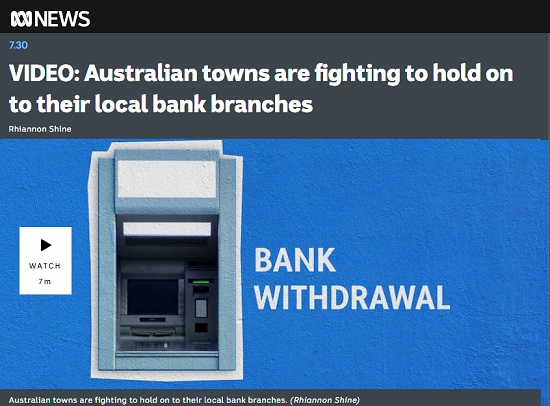The Australian Alert Service is the weekly publication of the Australian Citizens Party.
It will keep you updated on strategic events both in Australia, and worldwide, as well as the organising activities of the Citizens Party.
To subscribe to the Australian Alert Service, it's easy, and it's secure.
Lead Editorial
11 January 2023
Vol. 25 No. 1-2
What we all need in 2023 are the essentials—a job, food and water, housing, healthcare, etc. Without those basics there is no livelihood, no family, no society or civilisation, no possibility for improvement. Access to banking—and particularly to cash—is another, just as crucial, essential. Without it you can’t transact within the economy at all times, including when the power is out or you lack internet access.
One of the jobs of governments is to ensure people have basic access to those essentials, regardless of who they are. The rapid rate of bank closures at the tail end of 2022 revealed the negligence of regulators that should be policing the obligation of banks to provide vital services. (p. 5)
The IMF’s Housing Market Stability and Affordability in Asia-Pacific report makes a similar case regarding access to housing, warning of the “double shock” of inflation and rate rises hitting Australians harder than most OECD countries. “[H]ousing prices may be as much as 70 per cent and 50 per cent above what a median household can afford in New Zealand and Australia, respectively”, it says, adding that 8 per cent of Australians spend more than 40 per cent of their income on housing, “overburdened” at a rate higher than the OECD average. This is important because “housing is a key determinant for health and education, and housing inequality can lead to perpetuating socio-economic inequality”, acknowledged the IMF.
Additionally, we face a “mortgage cliff”, with two-thirds of all fixed interest rate mortgages due to reset this year to a rate around three times higher. Sixty per cent of people with resetting mortgages will need to squeeze at least 40 per cent extra—thousands of dollars—from the monthly budget. But falling housing prices, down an average of 8 per cent nationally last year, the biggest collapse since 2008 and now in the “steepest [decline] on record” according to Leith van Onselen at MacroBusiness, will unfortunately not see a reset of mortgage values.
The scale of the rate reset has few historical precedents, barring perhaps the US experience with subprime loans before the 2007-08 crash, David Rodgers wrote in the Australian on 4 January: “Australia hasn’t seen anything like it before.” A boom of low-rate money from the Reserve Bank’s $188 billion Term Funding Facility (TFF) and anticipated low rates for years to come saw fixed-rate loans grow from 15-20 per cent to around 35 per cent of mortgages.
And the pressure for continued rate rises is on, as banks look for alternatives to the cheap but maturing TFF, with loans due to be repaid over 2023-24. Some banks will face margin calls on their TFF loans, meaning they will have to post additional collateral with the RBA. This is because the RBA had frozen valuation of bank securities provided as collateral for three years when the TFF commenced in 2020 but will “unfreeze prices in early 2023”. Citibank analyst Brendan Sproules, according to the AFR, believes “an orderly repayment of the TFF might be the least likely outcome” and that due to the “severe” and “unpalatable” impost that repayment would require, regulators may be forced to intervene to extend TFF maturity dates “rather than let households bear financial pain”. Actually, it is the banks that this scheme was designed to protect, and any extension would be to that end. The RBA admitted there is “no statistically significant evidence that the TFF increased credit supply to businesses.” Rather than propping up the collapsing global financial bubble, it should be dismantled and replaced with national credit administered through a people’s postal bank to rebuild the real economy.
Recognition of this reality is reflected in the support for the Citizens Party’s postal bank proposal, with several more councils demanding the government act to ensure their economic vitality, which depends upon access to banking. Saving bank branches means saving cash, and cash access is more than an essential service—it also secures personal sovereignty and independence from the collapsing financial system.
In this issue:
- Fight fake regulation! Make your submission to ASIC inquiry ASAP
- Media catching on to regional banking crisis, war on cash
- No regional Australians, things aren’t quite as the banks say
- The good, the bad and the ugly of regional banking in 2022
- CHOICE reveals regional banking pain
- Canberra casts out its fake ‘Chinese spy’ Wang Liqiang
- Central banks map horror 2023 for masses
- Exposed: Ukraine slaughtered for ‘NATO mission’ vs Russia
- Persistence and focus gets attention
- Remembering Tony Barry, 1941-2022–Australian actor, political activist, ACP supporter
Click here for the archive of previous issues of the Australian Alert Service








